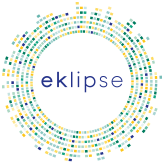Eklipse answers requests in a four steps process:
1. Screening phase: This step aims to identify the policy and societal relevance of the request at the European level and the general needs of the requester, resources available, and timeframe.
2. Scoping phase: A scoping group liaises with the requester to:
- refine and clarify the question
- identify how Eklipse could provide added value.
- Propose methods and approaches for answering the request.
During the scoping phase, the Eklipse scoping group looks for knowledge and expertise on the refined question to identify the state-of-the-art and avoid potential duplications. This process is done via an open Call for Knowledge using social media forums. Once Eklipse and the requester agree on the reformulation, the request can move forward, and the answering process can start.
3. Answering phase: Based on a Document of Works developed during the scoping phase under the supervision of the scoping group and in close collaboration with the requester an open Call for Experts will be announced to invite experts to create an Expert Working Group (EWG). This EWG consists of scientists and practitioners experts in the request field and has the crucial responsibility of answering the request.
4. Final Synthesis: Requesters receive targeted responses based on the best available knowledge within 6-18 months, depending on their needs and the complexity of their request. All final synthesis and additional end product(s) are widely disseminated and made publicly available.
More information can be found on: https://eklipse.eu/process/


